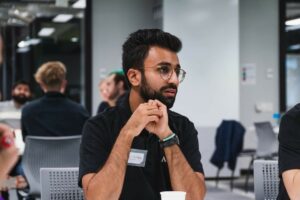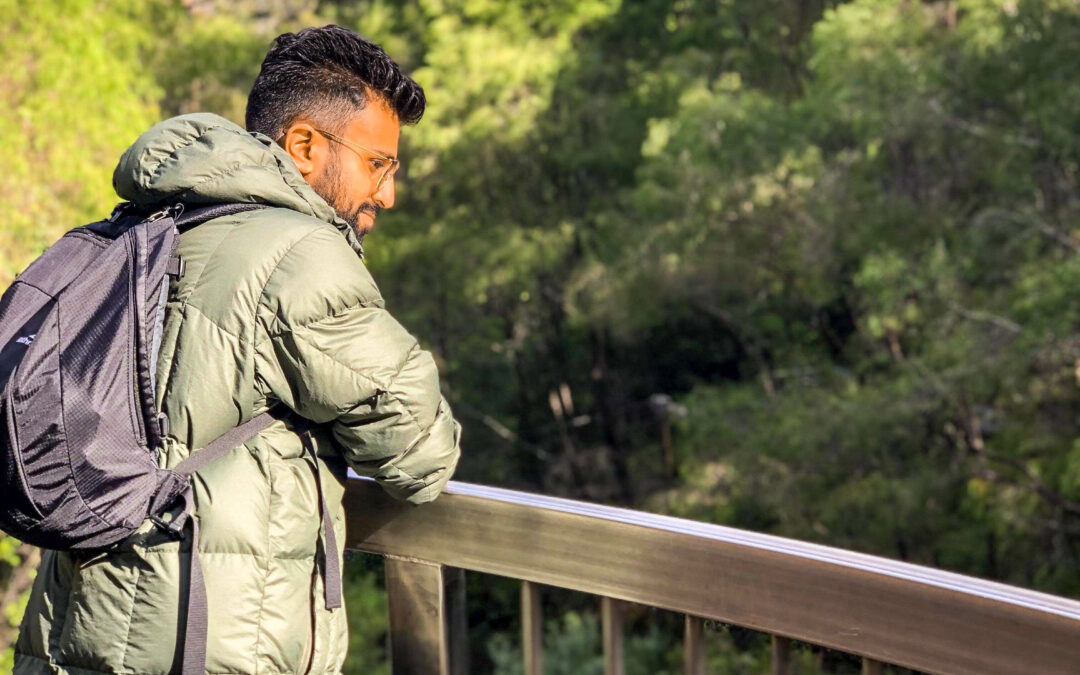One day on his daily commute to primary school, they took a detour. Roadworks lead the school bus through Kibera, a neighbourhood that is home to Kenya’s largest slum. Outside the bus window, sewage was used as a domestic water source and layers of smoke formed a thick smog blanketing Kibera’s streets. Witnessing widespread human hardship in his own home town, Vikrant hoped that in a future world Kibera’s residents would be free of poverty.
Vikrant was born with a fascination for understanding how things work. In Kenya, encyclopedias were Vikrant’s regular reading material and gave him an understanding of the world. Vikrant moved to Australia with his family in 2008, just before starting high school. A desire to support those less fortunate and a curiosity for understanding the workings of things, led him to a chemical engineering degree at the University of Western Australia.
During this period, Vikrant became an EWB volunteer with the Western Australian chapter. He quickly noticed the importance of EWB’s work, amidst working with like-minded individuals.
“At the time, I wanted to stay true to my roots and ally with people and organisations that were dedicated to using their knowledge to help those who did not have access to it, through no fault of their own,” Vikrant says.
The privilege of education
Vikrant’s participation in an EWB Design Summit in Cambodia in 2016 highlighted his appetite to impart important knowledge to others. Furthermore, he sees this as a requirement of the privileged position he has gained from receiving a quality education.
“I remember talking to the village chief, through a translator, and realising that the most privilege we have is knowledge,” he explains. “We are fortunate to have an amazing schooling and university system that teaches us so many things, not least of which is logic and a human-centred problem-solving mindset.”
With Vikrant’s social awareness and passion for engineering, it’s no surprise he is currently supporting the development of water purification technology in Timor Leste. Volunteering remotely as an EWB field professional, Vikrant reiterates the vital role of empowering local communities who facilitate and maintain the technology long-term.
“If we base technology on human-centred design, community members can use their logic and core skills to progress the design further,” he emphasises.
“They know what is best for them, and we are there to help them understand how to achieve it.”
Moreover, Vikrant is overcoming the challenges of communicating remotely with local communities maintaining the projects.
“It can be difficult to understand Tetun and Portuguese at the best of times! I have learnt some key phrases and to speak in simple terms to convey my messaging accurately,” he says. “People can be shy, but one must be patient and let everyone grow and talk when they are comfortable.”
Simplifying technology
Technology requires tailoring to suit the needs of the people in consideration of their specific living environment. Specifically, the water purification project ensures community members play important roles in developing and maintaining the technology.
Vikrant is passionate about overcoming misconceptions of how we define technology and its purpose. His definition of technology is simple and inclusive.
“When you think of technology, you may immediately think of computers, and machinery, but technology is a tool of any kind,” he explains. “It’s a specific thing that has been designed to address the needs and wants of communities and wider stakeholders.”
Technology that efficiently targets and supports community needs is at the heart of EWB’s goals for supporting community development.
“When we consider the needs and wants of communities and wider stakeholders, we recognise human element in the design of projects.”
Normalising a world of helping others
Vikrant hopes for more of us to put aside our differences and work towards a common goal. This involves listening to the experiences and stories of others to co-produce solutions for the future.
“We could all form the largest, most diverse database with solutions to possibly everything and anything,” Vikrant says.

Vikrant at an EWB talk night.
As global citizens, Vikrant believes we play equally important roles in listening to others create a positive future.
“I hope that people can be more open-minded and conscious about themselves in any given situation,” Vikrant reflects. “I hope that we can normalise such ethical behaviours into society to the point that we don’t bat an eyelid at all.”
This vision for a world that normalises collective social action drives Vikrant’s pursuit in engineering. Yet, equally, it presents a level of fear. An egocentric world where individual interests prevail over human collaboration for the greater good concerns Vikrant. However, Vikrant sees himself in a privileged position, with the power to impart knowledge that positively influences the lives of others.
Collective action
Vikrant is inspired by the leadership of Liverpool FC captain Jordan Henderson. Henderson was awarded an MBE in June for his services to charity and advocacy against racism. Whilst Vikrant may not have the fame of Henderson, he recognises the importance of his own work in improving the lives of others.
“If I can play a role in helping a family avoid walking three miles a day to get water, they can spend more time rearing chickens and grains. Resultantly, the family can then send their children to school and kickstart a cycle of education leading to positive change in the village,” he explains. “Through the gift of knowledge, a stint as a volunteer goes a long way. It does not have to be a full time commitment. Any help helps.”
These experiences are developing Vikrant’s professional career. Through working as a Fire Consultant for Omnii, Vikrant now better engages with clients since overcoming the communications challenges he had with his Timor-Leste colleagues.
“It is as equally challenging to understand someone over choppy wireless internet from a few thousand miles away as it is to explain to an impatient client that their reports are being reviewed by an external authority and you have no control over it.”
Vikrant knows that he’s contributing to positive change in the world. He continues to support the development of overseas engineering projects and empowerment of local communities. Furthermore, Vikrant will continue to demonstrate his passion to help others and share the EWB ethos to colleagues, friends, and future volunteers.


